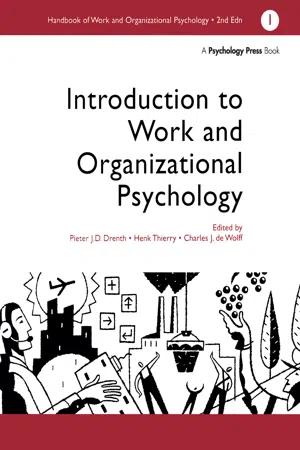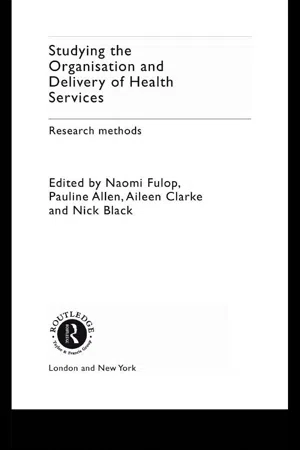Psychology
Psychology at Work
"Psychology at Work" refers to the application of psychological principles and research to the workplace. It encompasses areas such as employee motivation, job satisfaction, leadership, and organizational behavior. Psychologists at work may be involved in areas such as employee selection, training, and development, as well as addressing workplace stress and conflict.
Written by Perlego with AI-assistance
Related key terms
8 Key excerpts on "Psychology at Work"
- eBook - ePub
A Handbook of Work and Organizational Psychology
Volume 1: Introduction to Work and Organizational Psychology
- Charles, De, Wolff, P J D Drenth, THIERRY HENK(Authors)
- 2018(Publication Date)
- Psychology Press(Publisher)
individual (and therefore to individual differences), such as selection, performance assessment, designing a career plan, support and advice in case of difficulties, etc. In other subject areas, however, individual differences among those employed remain a little more in the background and attention is focused on the behaviour of what we wish to call “sets” of people. Such a set may have the characteristics of a group, defined in a social-psychological sense—such as semi-autonomous or self-steering units in a company—but this is not necessarily the case. Consider topics such as (re)designing work tasks, enhancing productivity, flexibilizing employment conditions, reducing the chance of stress. The common element in human behaviour, then, is for example their position as employees in a work organization, the fact that they come under the same Collective Labour Agreement, or that they attend the same course or take the same training. It is true that work and organizational psychologists are concerned with human behavioural characteristics in relation to these topics, but not (primarily) with individual differences.Second, we have the concept of employment or work. In a strict sense, work refers to the activities someone performs based on his or her position in a work organization and entitle him/her to an income or another financial recompense. This context applies to most topics in work and organizational psychology. But in addition, an increasing amount of interest has developed for topics relating to other forms of work. For example, it is important to know what interests and objectives pupils consider concerning their first position, how entrants to the labour market are made fully aware of the standards and values in their first company (socialization), how people suddenly confronted with dismissal can be motivated by devoting themselves to new challenges, how the elderly are prepared for the time in which they no longer have a job, and so on. More and more people will also (have to) adjust themselves to having more than one career, constant further training and retraining and using leisure time meaningfully during intermediate “jobless” periods.The third aspect, behaviour at work in or in connection with a work organization - eBook - ePub
Work, Organizational, and Business Psychology
An Introductory Textbook
- Hannes Zacher, Nale Lehmann-Willenbrock, Hannes Zacher, Nale Lehmann-Willenbrock(Authors)
- 2022(Publication Date)
- Kohlhammer Verlag(Publisher)
As a subfield of psychological science, WOB psychology is concerned with people’s experiences and behavior in the context of individual and team-based work, in organizations, and in the economy more broadly. The objective of WOB psychology is to derive scientific principles of individual, group and organizational behavior and apply this knowledge to the solution of problems at work (APA, 2008). Note that the focus of this book is on work as part of paid employment in business («for profit«), non-profit, public organizations, or self-employment. However, many of the topics, theories, methods, and findings covered in this book can also be applied to understand people’s experiences and behavior in other work contexts, such as non-paid childcare or eldercare work, household work, volunteer work, and activism.Work psychology deals primarily with the influences of work tasks and working conditions on people’s experiences (e.g., satisfaction, strain) and behavior (e.g., performance, safety behavior, turnover). Moreover, work psychology focuses on the individual characteristics, actions, and training that are necessary to successfully complete work tasks (i.e., work performance). To this end, work psychology is particularly concerned with the systematic analysis and design of work tasks, jobs, and work more generally. Organizational psychology aims to describe, explain, and potentially change people’s experiences and behavior in a social context, the organizational context, and it is concerned with how being a member of an organization with certain characteristics, structures, and processes (e.g., communication, leadership, conflicts, negotiation, socialization) impacts on people’s experiences and behavior. The area of personnel psychology is traditionally considered to be an important sub-area within both work and organizational psychology. Personnel psychology considers people in their roles of employees of an organization (i.e., with a contract that requires them to complete tasks according to their job description). The focus is on people’s requirement to show ideally high work performance in exchange for an income. Accordingly, personnel psychology is concerned with personnel recruitment (sometimes also called personnel marketing), personnel selection, and personnel development (including training, but also making vocational and choices and longer-term career development), as well as performance appraisal and performance management. Finally, the area of business psychology - eBook - ePub
Work and Occupational Psychology
Integrating Theory and Practice
- Lara Zibarras, Rachel Lewis(Authors)
- 2013(Publication Date)
- SAGE Publications Ltd(Publisher)
Part I
Introduction to work and Occupational Psychology
Passage contains an image
1 What is Occupational Psychology? Lara Zibarras and Rachel LewisLearning outcomes On completion of this chapter you should:- have an overview of the history of Occupational Psychology in the UK;
- understand the key changes that have taken place in the work environment over the 20th century and into the 21st century;
- understand what Occupational Psychology is today, with an overview of the broad areas covered;
- appreciate how Occupational Psychology differs from other areas, such as human resources and management consultancy.
Introduction
The area of applied psychology relating to people at work and in organisations has a number of different labels. Within the UK we generally tend to use the term Occupational Psychology . This is the official title and is protected by law. However, you may also come across the labels Organisational Psychology, Business Psychology or Work Psychology . Elsewhere, such as in Europe, it is common convention to use the term Work Psychology ; while in the USA, it is commonly labelled Industrial and Organisational Psychology (or I/O Psychology ).So, what is Occupational Psychology? Broadly speaking, it is the branch of applied psychology concerned with human behaviour in work and organisational settings. As defined by the British Psychological Society (BPS), Occupational Psychology is about applying the science of psychology to people at work ; where work is generally considered to be paid employment. That said, some researchers and practitioners have increasingly been exploring the links between work and non-work, such as the increasing blurring of boundaries between work and non-work hours (Brough and O’Driscoll, 2010).In this chapter, we first explore the history of Occupational Psychology from its inception during the early part of the 20th century, through to modern day Occupational Psychology. Next, we consider some ways in which the work environment has changed during the latter part of the 20th century and the early 21st century, and the influence this might have had on Occupational Psychology. Finally we consider some key ways in which Occupational Psychology might differ from other, seemingly similar, areas. - eBook - ePub
The Psychology of Behaviour at Work
The Individual in the Organization
- Adrian Furnham(Author)
- 2012(Publication Date)
- Psychology Press(Publisher)
Much of the objection to the human relations perspective has been initiated by modern behavioural scientists who are interested in many of the same phenomena. Behavioural scientists are concerned with the systematic analysis of human behaviour and take pride in the objectivity with which they approach their subject and their adherence to the conventional methods of experimental science. They also view their research as interdisciplinary in character and realize that it is often difficult, if not impossible, to understand the sociology of a group separate from the psychology of the individuals comprising it and the anthropology of the culture within which it exists. However, there have been few subsequent studies, of whatever scientific quality, that have had such an influence on work psychology thinking (Duncan, 1978).Integrating the different perspectivesThis history of organizational psychology and work psychology can be approached in different ways through different perspectives. It is important to emphasize that these histories are complementary rather than contradictory.The history of work psychology can probably be usefully thought of as falling into three categories. From the turn of the twentieth century until the beginning of the Second World War, work psychology was termed “scientific management” or industrial psychology. In this period, workers were thought of as factory hands. Both management and employees were thought of in rational economic terms. The idea that scientific principles could be applied to the world of work (especially management and ergonomics) was new, but the great thinkers of the day – Fayol, Taylor and Weber – all stressed this. They all believed that, by following relatively straightforward explicit principles, organizations could become more efficient. All the writing in this early period emphasized structure, order, logic and rules.The industrial psychologists of the day certainly saw their job as increasing efficiency. The image of the time-and-motion psychologist hiding in the cupboard spying on workers probably arose at that time. The work psychology researchers and psychologists of the day certainly “took the side of management”: they were not interested in occupational fatigue out of compassion for the workers, but rather how to ensure the most cost-efficient production from those workers. Yet it would be unfair to the thinkers and researchers of this first period to argue that they were not concerned with worker welfare. In hindsight it may seem patronizing, but many large companies took a genuine interest in the health and living standards of their workers. - eBook - ePub
Studying the Organisation and Delivery of Health Services
Research Methods
- Pauline Allen, Pauline Allen, Nick Black, Aileen Clarke, Naomi Fulop, Stuart Anderson(Authors)
- 2004(Publication Date)
- Routledge(Publisher)
There are a number of sub-disciplines within psychology, including elements drawn from the arts, humanities, and the biological and physical sciences as well as social science. One way of viewing the sub-disciplines is as follows.- Biological psychology examines the relationships between brain and body and the neurological and physiological ways in which psychological processes are manifested.
- Social psychology considers the ways in which the behaviour, thoughts and emotions of individuals and groups influence, and are influenced by, their social contexts.
- Personality psychology focuses on the nature, configuration and expression of the general psychological characteristics of humanity and the specific psychological characteristics of individuals.
- Cognitive psychology involves the study of thought processes such as problem solving and memory, as well as issues on the border with biological psychology such as the processing of visual and auditory information.
- Developmental psychology concerns how individuals unfold in all the above areas, mainly during childhood but also during the adult years.
Within psychology there are a number of areas of application which draw upon concepts, theories and techniques from the five sub-disciplines described above. These areas of application also boast some theories, concepts and techniques of their own, which to a limited extent feed back into psychology more generally. One of these areas of application is termed ‘organisational psychology’. And normally this organisational context is that of work. In fact, the usual name in mainland Europe for this area is ‘work and organisational psychology’. In North America it is ‘industrial/organisational (I/O) psychology’. In the United Kingdom alone, it is often also referred to as occupational psychology. There are other names as well, each with subtle messages about what is included and excluded. The term ‘organisational psychology’ tends to exclude elements close to physical science such as ergonomics. But even that is not a hard and fast rule.The dominant paradigm in psychology is borrowed from the physical sciences. It tends to spill over to a greater or lesser extent in the applied areas, including organisational psychology. It has consequences for the ways in which problems and issues are framed, the methods used to investigate them, the way that research is reported and the kinds of conclusions that are drawn. For the sake of brevity it will be referred to here as the positivist paradigm (see Chapter 1 - eBook - ePub
Well-being and Performance at Work
The role of context
- Marc van Veldhoven, Riccardo Peccei(Authors)
- 2014(Publication Date)
- Psychology Press(Publisher)
It is exactly here that individual work actions become very strategic indeed: how to achieve work goals given current demands, constraints, knowledge and internal states. This also implies that work action is not static: workers choose different work strategies not only depending on differences in situational demands and constraints, but also depending on personal, internal fluctuation in the variables mentioned (Hockey, 1997). As an example: maybe a worker is well-trained for a certain task, yet is so tired by the end of a shift that maintaining appropriate goal-directed work action (job performance as action) is impossible. One of the most important developments in recent work psychology has been to demonstrate that work is not stable from one task to the next, from one day to the next, from one client to the next (Bakker & Daniels, 2013). Indeed, there is a large amount of intra-individual variation in work, well-being and performance. Diary studies, in particular, are capturing this new area of investigation in work psychology more and more clearly (Ohly, Sonnentag, Niessen & Zapf, 2010). What we learn from these diary studies is that the ‘individual at work’ is fluctuating, and indeed work is always dynamic and momentous. Now that we have introduced the more immediate setting, we can move to the wider circumstances influencing work actions. A second type of context is the distal work context. This refers to the organizational and societal environment in which work takes place. These factors impact on work in a more indirect way. They are more remote, setting the stage for or shaping the immediate work context, but they are not actually a constituent part of the immediate work context as such, or directly impinge on work action itself (i.e. regulation). To illustrate this point, think of the effect of a supervisor on work - eBook - ePub
Education and Psychology in Interaction
Working With Uncertainty in Interconnected Fields
- Brahm Norwich(Author)
- 2002(Publication Date)
- Routledge(Publisher)
3 Psychology: study of humanity or science?
Psychology is a vast and ramified discipline. It contains many mansions. But this does not prevent it from being intellectually divided against itself. Taylor (1985, p. 117)Introduction
I concluded in the last chapter that educational theories are diverse and focus on different aspects of the educational field: what is to be learned, the social and personal aims of learning and the techniques of learning. The latter two aspects relate directly to basic beliefs about the nature of the person and learning, what I called meta-psychological assumptions. When educationalists explore these assumptions conceptually and empirically they begin to ask psychological questions and become involved in problems and questions covered by the field of psychology. This connection also relates to the historical development of psychology by scholars and practitioners involved in education. Education therefore needs psychology as a theoretical and technical resource and guide, as what can be called a contributory discipline. There is the risk, however, that psychology, particularly in its causal scientific version, comes to be applied without the critical role of educational theory and the interpretive participation of teachers. Psychology then assumes the dominant role in the relationship. This raises the question of whether education also contributes to psychology. How much does psychology need practical problems and questions from a field like education? To answer these questions calls for an examination of the contemporary issues and agendas in psychology, which is the focus of this chapter.Psychology is an alluring, puzzling and even a mysterious field. It can be seen to contain crucial knowledge and understanding about the mind and human behaviour which can answer many of the questions about human nature which concern us all. Such answers can hold out the promise of solutions to human problems, something which is particularly relevant in a secular age when the traditional answers from religion have become less plausible and acceptable. It is seen (witness the images projected by the media) as offering those who are familiar with its secrets the potential, if not the actual power, to control and perhaps manipulate others. Psychology, focusing on the mind or the psyche, also has associations with what is not physical and material, with ghostly processes which lurk in some immaterial realm. Though there has been a significant growth of a scientific approach to psychology over the last century, and that is now the dominant mode of study, this development has not been welcomed consistently. Put briefly and simply, a scientific mode offers the authority and power associated with science in other fields where it has achieved considerable successes, such as in physics and biology. This arises from an agenda which aims to identify causal mechanisms which can be applied to the control of psychological outcomes. But this very process can also be seen to be dehumanising in denying the role of human meaning and agency. Despite this, psychology has over the last century attracted many hopes and expectations. This was recognised by William James as regards teachers and teaching, as noted in the last chapter. Currently psychology is attracting many students in Higher Education. Figures quoted by Gale (1997), for example, indicate that in the USA psychology produces the second largest number of major graduates, after business administration and management. A world-wide survey indicates a doubling of the number of qualified psychologists between 1982 and 1992. There has been a similar growth in Higher Education psychology places in the UK. - eBook - ePub
- Duane P. Schultz, Sydney Ellen Schultz(Authors)
- 2020(Publication Date)
- Routledge(Publisher)
Enhancing job satisfaction is a major concern in business today. Corporate leaders call on I-O psychologists to improve the attitudes of workers toward their jobs and their organizations. Enhanced satisfaction with work can reduce grievances and other labor disputes and decrease absenteeism, turnover, work slowdowns, faulty products, and accidents.Appropriate employee selection methods, such as psychological tests, designed and monitored by I-O psychologists help ensure that the most qualified applicants are hired. For example, researchers compared federal government employees who were hired on the basis of their cognitive ability (intelligence) test scores with employees hired on the basis of level of education and work experience. The tests were found to be far superior for selecting better and more productive workers, and the cost savings were substantial.These examples indicate the importance of the work of I-O psychologists to all types of employing organizations. I-O psychology contributesto organizational efficiency and improves the bottom line on the company’s financial report.I-O psychology The application of the methods, facts, and principles of the science of psychology to people at work.AN OVERVIEW OF THE DEVELOPMENT OF I-O PSYCHOLOGY
Psychology is the science of behavior and mental processes. Industrial-organizational (I-O) psychology involves the application of the methods, facts, and principles of psychology to people at work. That fact that psychology is a science tells us how it operates. A science deals with facts that can be seen, heard, touched, measured, and recorded. Hence, a science is empirical, which means that it relies on verifiable observation, experimentation, and experience, not on opinions, hunches, pet notions, or private prejudices. A science is objective in its approaches and results.It is important to remember that science is defined by its methods, not by its subject matter. In methods and procedures, I-O psychology attempts to be just as scientific as physics or chemistry. When psychologists observe the behavior of people at work, they do so in the best traditions of science: objectively, dispassionately, and systematically.
Learn about this page
Index pages curate the most relevant extracts from our library of academic textbooks. They’ve been created using an in-house natural language model (NLM), each adding context and meaning to key research topics.







